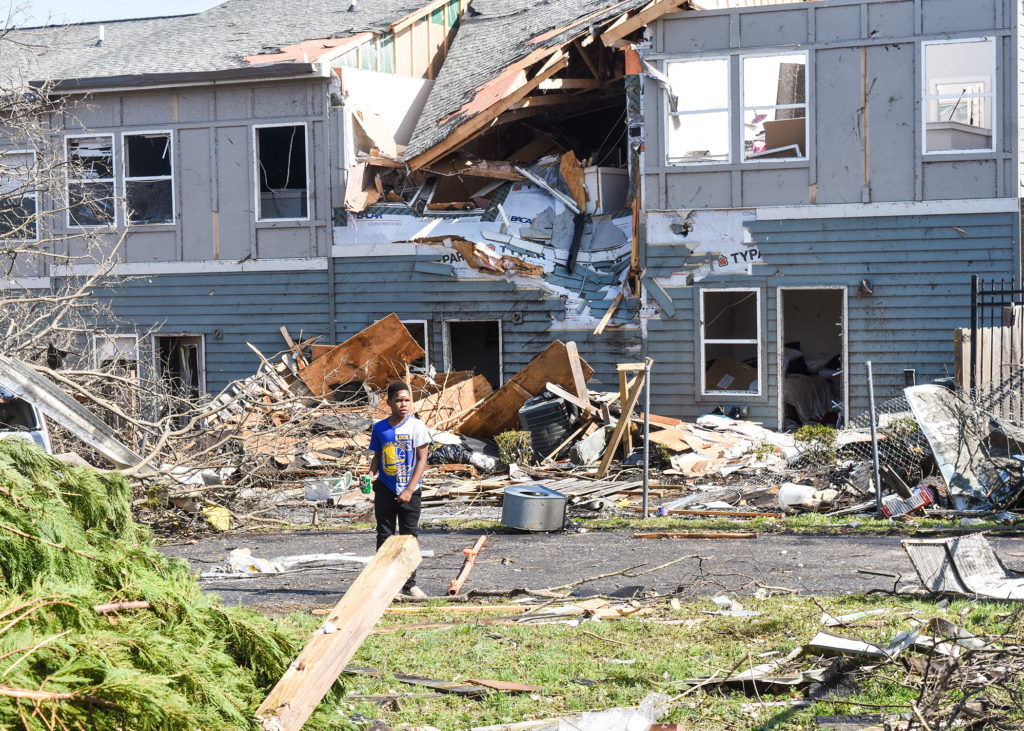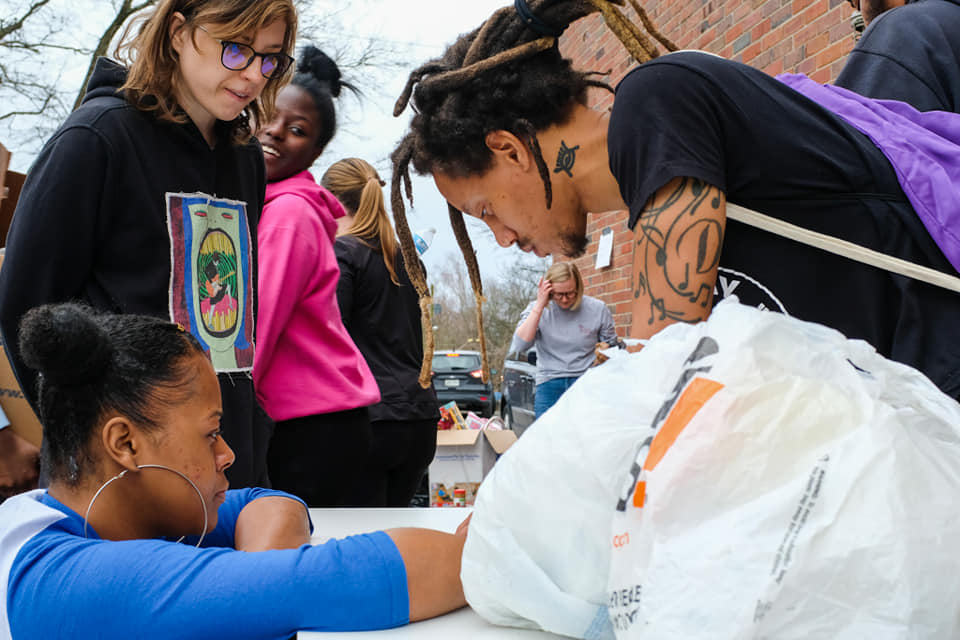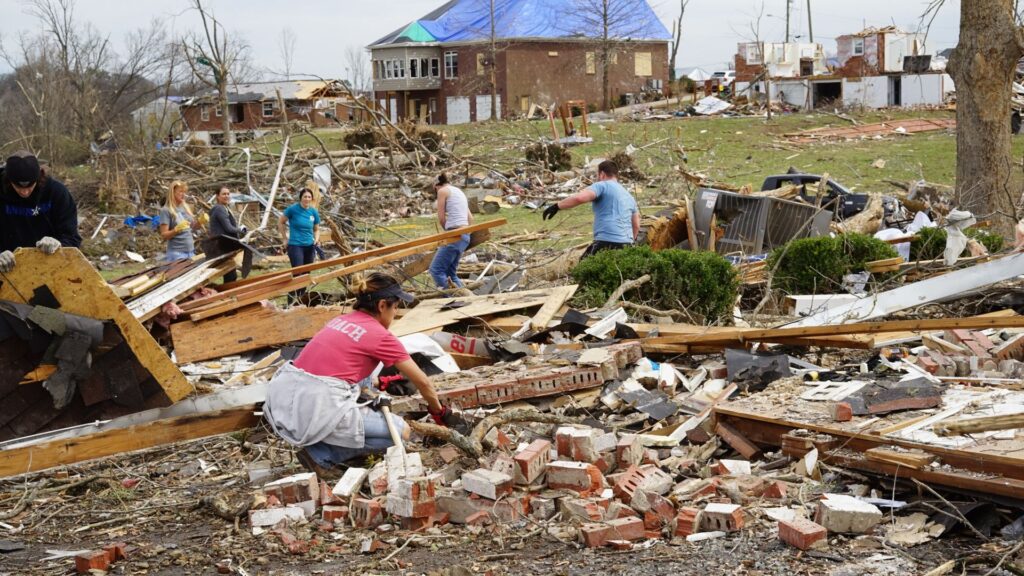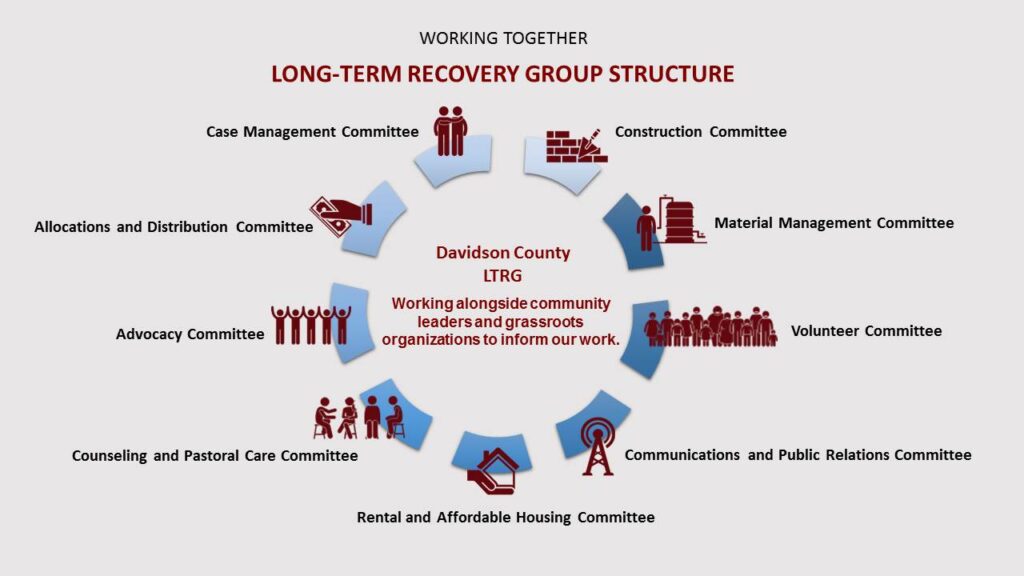Focus Remains on Identifying, Helping Tornado Survivors as Rebuild Efforts Launch
In neighborhood after unlucky neighborhood in Davidson County, including North Nashville and Germantown, East Nashville, Donelson and Hermitage, telltale signs remind you of the death and destruction caused by Tennessee’s tornadoes in early March.
Blue tarp substitutes for a roof. Exposed drywall masquerades as siding. A mangled stump and haphazard piles of limbs remain where once stood a majestic tree.
The eastbound series of tornadoes that touched down in the late night darkness of March 2 and early March 3, stretching from Gibson County in West Tennessee through Nashville to Mt. Juliet and Lebanon in Wilson County and finally to the Cookeville area in Putnam County.
Two people lost their lives in Nashville, and an additional 23 were killed in Benton, Wilson and Putnam counties.
Just in Davidson County, the destruction was staggering, with more than 100 roads and 60 alleys initially closed and more than 5,000 truckloads of debris removed. Metro’s Codes Department counted 448 commercial buildings and 1,542 residential properties —a total of 1,990 buildings impacted by the tornado. The economic impact of the damage runs up to estimates of $1.5 to $2 billion.

From despair comes help, and hope.
Finding and serving tornado survivors — in the midst of a worldwide pandemic and economic crisis, no less — remains the laser-like focus of the Davidson County Long-Term Recovery Group (LTRG).
The LTRG is a volunteer collaboration of multiple organizations, including but not limited to nonprofit agencies, community civic and service groups, faith-based, and educational groups that meet and work together to address the long-term needs of Metro Nashville residents who have been affected by disaster.
As detailed in its bylaws, the LTRG’s mission is to provide coordinated management of the long-term recovery response to individuals in Nashville/Davidson County affected by disaster.
The LTRG offers additional long-term assistance to individuals affected by the disaster who do not have adequate personal resources, and stewards volunteer, material and financial resources.
Its goal is to provide cost-effective and coordinated delivery of services so that survivors receive unduplicated assistance in a timely, efficient and equitable manner.
With more than 80 individuals representing 30 organizations participating on regularly scheduled calls, the group has, to date:
- Identified the areas of greatest need;
- Identified organizations capable of addressing those needs;
- Worked to ensure it is supporting each organization’s services while providing support to survivors from all of the impacted areas in Nashville.
Additionally, important feedback from the affected neighborhoods has resulted from two rounds of door-to-door canvassing — the most recent in late September.
The LTRG also promotes long-term case management through the Tornado Recovery Connection and its helpline at 615-270-9255. Among the services offered are counseling and mental-health support; direct financial assistance; FEMA mediation; food assistance; home furnishings; home repair and construction services; household goods and clothing; insurance mediation; legal assistance; mortgage assistance; primary healthcare services; rent assistance; temporary and permanent housing; and utility payment assistance.
Through a late September canvassing coordinated by Hands On Nashville, volunteers successfully contacted 1,192 homes in Donelson, Hermitage, East and North Nashville, with reports that:
- 298 homeowners were actively making progress with construction;
- 786 homes appeared completed with construction or untouched by tornado;
- 43 survivors provided phone numbers for the Tornado Recovery Connection to reach out, and 12 calls came into the helpline after TRC information was left at their homes.
Additional outreach efforts in North Nashville during the September canvassing were led by local nonprofit Gideon’s Army and its volunteers.

Going forward, the committee will continue to reassess the greatest needs as learned by the Tornado Recovery Connection and its partners. Additionally, the Nashville-based nonprofit Westminster Home Connection is coordinating construction services proved to survivors.
Thus far 193 homes in Davidson County have been targeted for rebuild (118) or repair (75).
“Our purpose, as the Long-Term Recovery Group, is to see that our community can recover from the tornado,” said Terry Rappuhn, founder of Westminster Home Connection. “We coordinate resources, focusing on survivors who have said they won’t be able to recover without assistance.
“It’s incredibly difficult for a survivor to recover from a disaster during a pandemic. That’s why the Long-Term Recovery Group’s entire focus is on what’s best for survivors.”
Eileen Lowery, Tornado Recovery Connection director for the United Methodist Committee on Relief (UMCOR) and chair of the Long-Term Recovery Group’s Case Management Committee said, “We have learned that a significant number of homes are either making active progress with construction, and there are also a number of homes that are either completed with construction or appear to have been untouched by the tornado from those we had on our radar as possible survivors impacted by the tornado.”
LTRG on Hiatus Since Flood a Decade Ago
A bit of history: Until the March tornadoes struck, the group didn’t have a reason to convene in the wake of a natural disaster since the 100-year flood in May 2010 left much of Downtown Nashville under water for weeks. The flood turned city streets from Bellevue to Antioch into temporary raging rivers. Damage was estimated at $2 billion, with almost 11,000 properties damaged or destroyed.
Nearly 10 years to the day later, mere moments after the tornadoes ripped through the area in the dark of night on March 3, Nashville-area organizers quickly sprang into action to provide immediate services to tornado survivors.
Residents, city officials and government entities, community leaders, faith-based organizations, and nonprofits began to assess the areas of need, setting up three Disaster Assistance Centers – in North and East Nashville and in Hermitage — as hubs for those impacted by the tornado to be directed to the resources in which they suddenly found themselves in need.
Early meetings at the Metro Nashville Office of Emergency Management included representatives of the Metro Nashville Mayor’s office, the American Red Cross of Tennessee, The Community Foundation of Middle Tennessee, Community Resource Center, Hands on Nashville, Goodwill Industries of Middle Tennessee, Second Harvest Food Bank of Middle Tennessee, the United Way of Greater Nashville, and several others organizations.
Just days later, though, the coronavirus pandemic and subsequent quarantine and economic shutdown hit the Middle Tennessee community with full force.

Tornado recovery and relief efforts changed course in the coming weeks.
Disaster Assistance Centers shut down. Representatives from the Federal Emergency Management Agency (FEMA) left the Nashville area. Citizen volunteers, their numbers plentiful in the days following the tornadoes, dropped off significantly because of the pandemic and safety concerns.
In the wake of these triple disasters – tornadoes, the pandemic, and economic upheaval — came the reformation of the Davidson County Long-Term Recovery Group, which began to meet on March 10 and put the pieces in place that will continue its vital work for the next 12 months to 18 months.
“The volunteers being the eyes for us significantly helped narrow down the great unknown to information that is more tangible and helpful in our work with survivors,” UMCOR’s Lowery said. “Not to mention having 1,191 survivors now having information related to TRC should problems arise in the future for our survivors.”
Organizing, Structuring the LTRG
According to the National Voluntary Organizations Active in Disasters’ Long-Term Recovery Guide, “A long-term recovery group (LTRG) is a cooperative body that is made up of representatives from faith-based, nonprofit, government, business and other organizations working within a community to assist individuals and families as they recover from disaster.”
With the help of Rebecca Finley and Greg Bailey of Finley + Bailey Strategic Communications — hired as consultants by The Community Foundation of Middle Tennessee to help reinstate the Davidson County VOAD (Voluntary Organizations Active in Disasters) just days prior to the tornadoes — the Long-Term Recovery Group convened virtually to continue the much-needed relief and recovery work.
“The LTRG’s system and structure has allowed us to pull together people at the table who truly do care and are interested in meeting the needs of tornado survivors,” Finley said. “The focus of our work is finding and serving individuals who have not yet received assistance and get them into case management and provide resources through the Tornado Recovery Connection.”
Said Bailey, “We will look back at this in five years and really see how the COVID-19 pandemic colored the recovery. We don’t really understand the enormity of it because we are just in the middle of it, so you can’t see the forest through the trees.
“What we continue to find is the spirit and desire of all these organizations to make folks whole again.”
Beyond the LTRG, a smaller committee was formed from the organizations identified in the City’s Emergency Management Plan (CEMP), government entities and others.
The committee is composed of representatives from:
- Catholic Charities of Tennessee, providing human services to enhance and enrich the quality of life for people in need;
- The Community Foundation of Middle Tennessee, which is the central depository for gifts of money;
- Community Resource Center, which is the central location for donated items;
- Hands on Nashville, which is the central hub for volunteer organization and implementation;
- Metropolitan Nashville and Davidson County Government;
- Office of Emergency Management, the City/County emergency management agency for disaster mitigation, preparedness, response and recovery efforts;
- United Methodist Committee on Relief (UMCOR), Tennessee Conference, which oversees recovery case management and the Tornado Recovery Connection helpline;
- United Way of Greater Nashville, facilitators of 2-1-1 information and referral helpline that provides resources to cover basic needs in times of crisis;
- Westminster Home Connection, coordinator of the construction services provided to survivors.

Representatives from these organizations also compose the Working Committees, which include:
- Advocacy Committee (AC): advocates on behalf of survivors and acknowledges issues that compromise their recovery, included but not limited to policy development, strategic alignment, government affairs, systemic challenges, etc.
- Allocations and Distribution Committee (ADC): responsible for coordinating the distribution of resources administered through the LTRG.
- Case management Committee (CMC): coordinating long-term disaster case management provided to individuals affected by disaster who seek assistance through the LTRG, including setting practices and standards for case managers.
- Communications and Public Relations Committee (CPRC): responsible for maintaining communications among the working committees, informing the public of the functions of the LTRG and promoting the work of long-term recovery.
Construction Committee (CC): responsible for the repair and rebuild of the homes of survivors in case management working with various construction agencies. - Counseling and Pastoral Care Committee (CPCC): The Pastoral Care Committee is dedicated to the spiritual care of tornado survivors. The path to wholeness after disaster can sometimes be overwhelming, and the pastoral care committee – alongside other referred professional counselors – will work with survivors to meet them where they are, providing purposeful listening as they overcome challenges related to disaster recovery.
- Material Management Committee (MMC): responsible for helping to coordinate collection of material resources to assist individuals affected by disaster.
- Rental and Affordable Housing Committee (RAHC): responsible for developing resources to address short-term and long-term housing needs related to individuals affected by disaster.
- Volunteer Committee (VC): responsible for helping to coordinate volunteers to assist individuals affected by disaster.
To emphasize the main objective of the group, as of mid-October 2,575 tornado survivors have received some type of touch point by members of the Davidson County LTRG. There have been direct-mail pieces delivered to survivors, volunteer-based neighborhood canvassing efforts, collaborative communication through organization newsletters and social channels, great support from area media outlets and mentions in Mayor John Cooper’s press conferences.
Collaboration has been key
Collaboration with various entities of Metro Nashville government and local and regional nonprofit agencies has been essential to the Long-Term Recovery Group’s efforts. Some of the organizations involved with recovery include:
| Affordable Housing Resources |
| American Red Cross of Tennessee |
| Armstrong Real Estate Foundation |
| Catholic Charities of Tennessee |
| Community Resource Center |
| Conexion Americas |
| Donelson Fellowship |
| First Baptist Church Lebanon |
| Gideon’s Army |
| Goodwill of Middle Tennessee |
| Greater Heights Missionary Baptist Church - Successful Survivors |
| Habitat for Humanity |
| Hands on Nashville |
| Hope Force International |
| Legal Aid Society of Middle Tennessee and the Cumberlands |
| Lutheran Services in Tennessee |
| Metro Social Services |
| Metropolitan Government of Nashville and Davidson County |
| Midsouth District Church of the Nazarene Disaster |
| Nashville Office of Emergency Management |
| NeedLink Nashville |
| Neighbor to Neighbor |
| Neighborhood Associations |
| Neighborhood Coalitions |
| Pathway Lending |
| Project Connect Nashville |
| Rebuilding Together Nashville |
| Salvation Army - Nashville Area |
| Samaritan's Purse |
| Second Harvest of Middle Tennessee |
| The Belonging Co. |
| The Community Foundation of Middle Tennessee |
| The Equity Alliance |
| The Glade Church |
| The Housing Fund |
| United Methodist Conference on Relief, Tennessee Conference |
| United Way of Greater Nashville |
| Urban Housing Solutions |
| West Nashville Dream Center |
| Westminster Home Connection |
“This community responds when it’s in crisis,” Finley said. “The collaboration has been fantastic to watch as organizations have shown up every week since March 3 to discuss and create solutions in response to the disaster.”

Header Image: Caring Middle Tennessee residents volunteer with the Community Resource Center, a valued LTRG organization who continues to provide resources to survivors from toilet paper to food to household goods. Photo courtesy Community Resource Center.
1 thought on “Davidson County Long-Term Recovery Group: What We’ve Done and Where We’re Going”
Comments are closed.